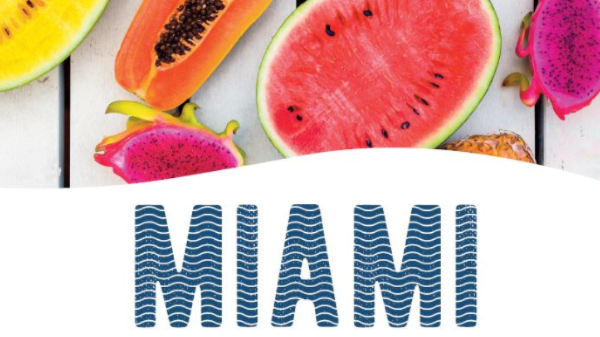
A sprawling eight-acre warehouse complex at Northwest 13th Avenue and Northwest 21st Terrace, the Miami Produce Center has served as the city’s terminal market for the past 84 years.
However, the market has been steadily shrinking in recent years as wholesalers move away from the city to their own facilities.
“The Miami produce industry is very spread out,” says Rosann Cabrera, owner of Bayshore Produce, LLC, BB #:263431 a produce buyer/broker and import/export business based in Miami. “There are companies all over the city, unlike many other wholesale terminals congregated into a market area.”
Douglas Tannehill, president of exporter Global Perishable Services LLP, BB #:276529 notes many of the larger companies have moved away from the market to Broward County and the western portion of Miami-Dade.
Global Perishable Services also migrated, recently moving to a 67,000-square-foot facility in Miramar, north of Miami. “It’s a much more efficient facility, and it’s built for this type of business,” Tannehill explains, adding that the new building “will help us assimilate the growth we’ve seen over the last few years.”
Regarding the terminal market, he says, “The area near the Miami Produce Center has been challenged—a bunch of property has been bought up around there, and I think the market area is going to go away.”
In 2016, real estate developer Robert Wennett paid $16 million for the Miami Produce Center, where he intends to build a mixed-use complex that could span 2.9 million square feet. The project will include urban farms, restaurants, vocational schools, creative workspaces, and both hotels and residential units.
As part of the massive project, the terminal market’s warehouses will eventually be converted into stores, restaurants, and workspaces. However, it may be a few more years before the transformation takes place, because the market’s produce sellers still have two years remaining on their leases.
This is multi-part feature on the South Florida produce industry adapted from the January/February 2020 issue of Produce Blueprints.
A sprawling eight-acre warehouse complex at Northwest 13th Avenue and Northwest 21st Terrace, the Miami Produce Center has served as the city’s terminal market for the past 84 years.
However, the market has been steadily shrinking in recent years as wholesalers move away from the city to their own facilities.
“The Miami produce industry is very spread out,” says Rosann Cabrera, owner of Bayshore Produce, LLC, BB #:263431 a produce buyer/broker and import/export business based in Miami. “There are companies all over the city, unlike many other wholesale terminals congregated into a market area.”
Douglas Tannehill, president of exporter Global Perishable Services LLP, BB #:276529 notes many of the larger companies have moved away from the market to Broward County and the western portion of Miami-Dade.
Global Perishable Services also migrated, recently moving to a 67,000-square-foot facility in Miramar, north of Miami. “It’s a much more efficient facility, and it’s built for this type of business,” Tannehill explains, adding that the new building “will help us assimilate the growth we’ve seen over the last few years.”
Regarding the terminal market, he says, “The area near the Miami Produce Center has been challenged—a bunch of property has been bought up around there, and I think the market area is going to go away.”
In 2016, real estate developer Robert Wennett paid $16 million for the Miami Produce Center, where he intends to build a mixed-use complex that could span 2.9 million square feet. The project will include urban farms, restaurants, vocational schools, creative workspaces, and both hotels and residential units.
As part of the massive project, the terminal market’s warehouses will eventually be converted into stores, restaurants, and workspaces. However, it may be a few more years before the transformation takes place, because the market’s produce sellers still have two years remaining on their leases.
This is multi-part feature on the South Florida produce industry adapted from the January/February 2020 issue of Produce Blueprints.



